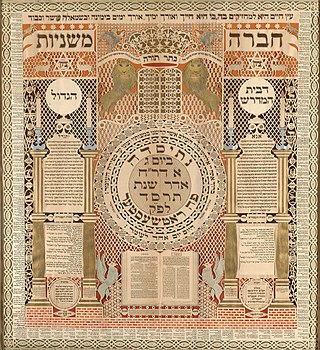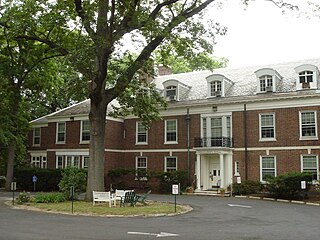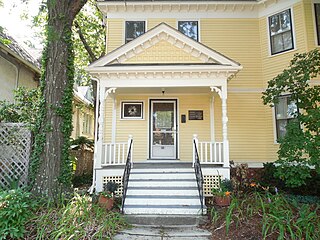Related Research Articles

Mordecai Menahem Kaplan was a Lithuanian-born American rabbi, writer, Jewish educator, professor, theologian, philosopher, activist, and religious leader who founded the Reconstructionist branch of Judaism along with his son-in-law Ira Eisenstein. He has been described as a "towering figure" in the recent history of Judaism for his influential work in adapting it to modern society, contending that Judaism should be a unifying and creative force by stressing the cultural and historical character of the religion as well as theological doctrine.

Reconstructionist Judaism is a Jewish movement based on the concepts developed by Rabbi Mordecai Kaplan (1881–1983) that views Judaism as a progressively evolving civilization rather than just a religion. The movement originated as a semi-organized stream within Conservative Judaism, developed between the late 1920s and the 1940s before seceding in 1955, and established a rabbinical college in 1967. Reconstructionist Judaism is recognized by many scholars as one of the five major streams of Judaism in America alongside Orthodox, Conservative, Reform, and Humanistic.

Kitniyot is a Hebrew word meaning legumes. During the Passover holiday, however, the word kitniyot takes on a broader meaning to include grains and seeds such as rice, corn, sunflower seeds, and sesame seeds, in addition to legumes such as beans, peas, and lentils.

Jewish Renewal is a Jewish religious movement originating in the 20th century that endeavors to reinvigorate modern Judaism with Kabbalistic, Hasidic, and musical practices. Specifically, it seeks to reintroduce the "ancient Judaic traditions of mysticism and meditation, gender equality and ecstatic prayer" to synagogue services. It is distinct from the baal teshuva movement of return to Orthodox Judaism.
Neo-Hasidism, Neochassidut, or Neo-Chassidus, is an approach to Judaism in which people learn beliefs and practices of Hasidic Judaism, and incorporate it into their own lives or prayer communities, yet without formally joining a Hasidic group. Over the 20th century neo-Hasidism was popularized by the works of writers such as Hillel Zeitlin, Martin Buber, Abraham Joshua Heschel, Lawrence Kushner, Zalman Schachter-Shalomi, and Arthur Green.

Counting of the Omer is a ritual in Judaism. It consists of a verbal counting of each of the 49 days between the holidays of Passover and Shavuot. The period of 49 days is known as the "omer period" or simply as "the omer" or "sefirah".

Shlomo Riskin is an Orthodox rabbi, and the founding rabbi of Lincoln Square Synagogue on the Upper West Side of New York City, which he led for 20 years; founding chief rabbi of the Israeli settlement of Efrat in the Israeli-occupied West Bank; former dean of Manhattan Day School in New York City; and founder and Chancellor of the Ohr Torah Stone Institutions, a network of high schools, colleges, and graduate Programs in the United States and Israel.

Arthur Ocean Waskow is an American author, political activist, and rabbi associated with the Jewish Renewal movement.
A chavurah or havurah is a small group of like-minded Jews who assemble to facilitate Shabbat and holiday prayer services and share communal experiences such as life-cycle events or learning.

The Reconstructionist Rabbinical College (RRC) is a Jewish seminary in Wyncote, Pennsylvania. It is the only seminary affiliated with Reconstructionist Judaism. It is accredited by the Commission on Higher Education of the Middle States Association of Colleges and Schools. RRC has an enrollment of approximately 80 students in rabbinic and other graduate programs.
Jewish feminism is a movement that seeks to make the religious, legal, and social status of Jewish women equal to that of Jewish men in Judaism. Feminist movements, with varying approaches and successes, have opened up within all major branches of the Jewish religion.

The Society for the Advancement of Judaism, also known as SAJ, is a Reconstructionist synagogue and Jewish organization in New York City, on Manhattan's Upper West Side. Founded in 1922 by Mordecai M. Kaplan, the rabbi who founded of Reconstructionist Judaism, the synagogue is affiliated with the Reconstructionist movement.

Havurat Shalom is a small egalitarian chavurah in Somerville, Massachusetts. Founded in 1968, it is not affiliated with the major Jewish denominations.

Arthur Green is an American scholar of Jewish mysticism and Neo-Hasidic theologian. He was a founding dean of the non-denominational rabbinical program at Hebrew College in Boston. He describes himself as an American Jew who was educated entirely by the generation of immigrant Jewish intellectuals cast up on American shores by World War II.

Ansche Chesed is a Conservative synagogue located at West End Avenue and 100th Street on the Upper West Side of Manhattan in New York City, New York, United States.
Jeffrey Schrier is an American visual artist. His art uses discarded or recycled objects to create modern interpretations of ancient or traditional texts, sometimes with references to Jewish themes. Schrier's "Wings of Witness" assemblage sculpture memorializes the victims of the Nazi holocaust with an installation of millions of soda-can tabs, collected by school-children, fashioned into an enormous pair of butterfly wings. The artist often uses educational workshops and volunteers in building his large-scale assemblage works.
Carole Beth Balin is a Reform rabbi and professor of Jewish history at Hebrew Union College-Jewish Institute of Religion in New York City. Her research interests include Eastern European and American Jewish history, the history of Reform Judaism, and gender studies. She received laudatory reviews for her 2003 book To Reveal Our Hearts: Jewish Women Writers in Tsarist Russia, and has co-edited two other books. She is a co-curator of "Bat Mitzvah Comes of Age", a traveling exhibition sponsored by the Smithsonian-affiliated National Museum of American Jewish History and the Moving Traditions Jewish non-profit.
Albert S. Axelrad is an American Reform rabbi, author, educator, and community leader. He fostered the American Jewish counterculture of the 1960s-1980s. He also served as Jewish chaplain at Brandeis University and Executive Director of its B'nai B'rith Hillel Foundation from 1965 to 1999.
The Jewish Catalog is a series of books published by the Jewish Publication Society in three volumes, which had a significant cultural impact upon the Chavurah movement of Judaism, and in the broader Jewish world, and were said to be "the most widely read books in the Jewish counter-culture," with total book sales of the series being more than half a million copies.
Rachel Cowan was a rabbi, leader, and spiritual innovator who founded the Institute for Jewish Spirituality. She helped interfaith families find more welcoming community in Jewish ritual life and was the mother of the "Jewish Healing" movement.
References
- ↑ "The SAJ Welcomes Rabbi Lauren Grabelle Herrmann (article on home page)". thesaj.org. 8 September 2015. Archived from the original on 2015-09-09. Retrieved 18 November 2015.
Rabbi Lauren began her term on July 1, 2015.
- ↑ Ansche Chesed Rabbi To Step Down: At issue is role of rabbi in prominent multi-minyan shul, The Jewish Week, January 12, 2001.
- ↑ Briggs, Kenneth A. (July 8, 1979). "Diverse Jewish Havurah Movement Grows; Difficult Obstacles Seen 'A holding Operation' Adherence to Law Not Strict". The New York Times .